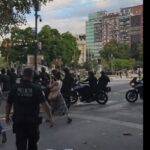
This Monday the 30th, journalist Jorge Lanata died. He was born 64 years ago in Mar del Plata and began his journalistic career at the age of 14 on Radio Nacional. After the return of the constitutional governments he was part of different projects such as El Porteño, Rock & Pop, El Periodista, but his biggest leap was the launch of Página 12, of which he was one of the founders. He directed it from 1987 to 1994, during which he lived through the stormy years of the end of the Alfonsín government, with the impunity laws and the economic crisis, but also the first of Menemism. Page 12 was at that time a renewal of journalism, with its critical and ironic covers. It had in its pages and in its audience progressive sectors that searched in its pages for topics such as human rights and the fights between organizations and families of missing persons, corruption, with remembered investigations into privatizations and the policies of Menemism. As part of that profile, Lanata was part of the construction of a “media map,” showing who owned the journalism companies and exposing the power of the Clarín group.
After that stage he carried out different television projects (Día D), editorials (Argentinos) and graphics (Veintiuno), where he tried to take advantage of his former profile as an independent journalist and “critic” of power, but in a turn increasingly linked to sectors of power itself. This allowed him to have a program on América 24 (Grupo Eurnekián) for several years and years later to found the newspaper Crítica de la Argentina. There he ended up associating with the Spanish businessman Antonio Mata, head of Aerolíneas Argentinas. Crítica ended in a closure that was faced by its workers in a conflict that lasted several months during 2010.
The next step was his landing at Grupo Clarín, in 2012, where he spent the last 12 years of his journalistic and political career. There he bet all his chips. Graphic columns (Diario Clarín), Lanata without filter (Radio Mitre) and Journalism for all (El Trece). Lanata then embraced the cause of “war journalism” (as Julio Blank recognized in an interview with Fernando Rosso in The Daily Left), where with data close to power and the format of “spectacle journalism” it focused against Mapuche communities, social organizations and questioned politicians, with special hostility towards Kirchnerism-Peronism. But he also dedicated space to criticizing the left, such as a 2019 monologue against Nicolás del Caño and Daniel Ruiz, persecuted by protests against the pension reform.
It could be said that he covered a large part of the “media map” that he knew how to draw, from progressivism to the previously criticized Noble and Magnetto. In that career he left many in-depth interviews with political, cultural, journalism and human rights figures and several “disciples” in the journalistic world, with the majority estranged in recent years.
After several health complications throughout his life, he had been hospitalized on June 14. It will be held at the Buenos Aires House of Culture (“La Prensa” Building), Av. de Mayo 575.
Source: www.laizquierdadiario.com
